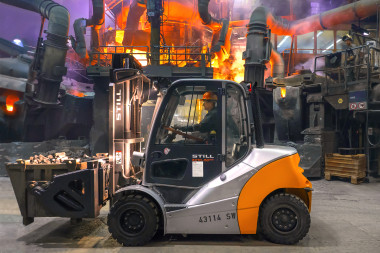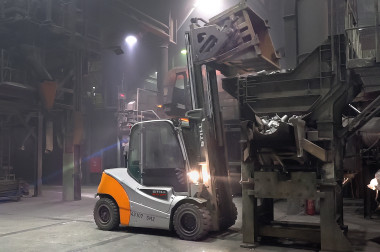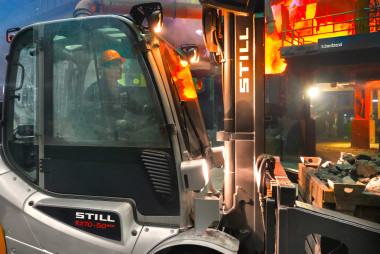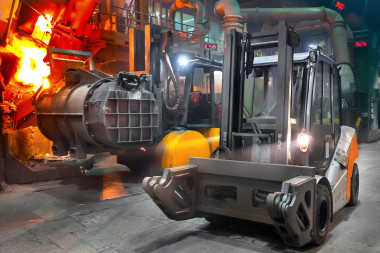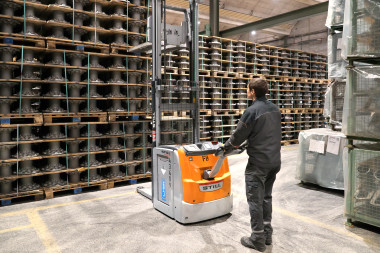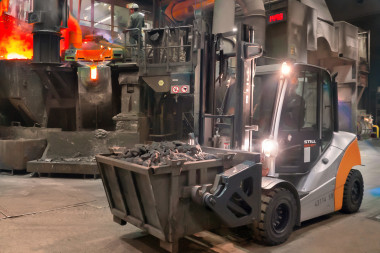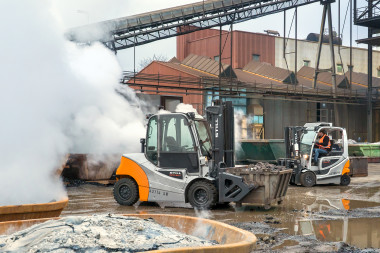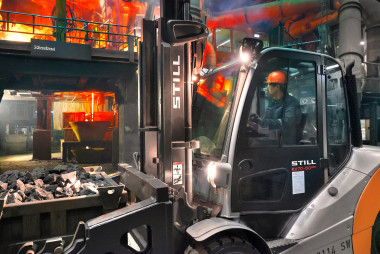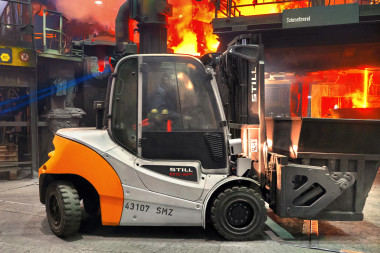Shifting loads in extreme conditions: new forklift fleet keeps the foundry moving.
Sector: Automotive/Foundry
Company: Approx. 2000 employees in Singen and Mettmann, near Düsseldorf. Revenue: 550 million euros.
Challenges: Constant modernisation of logistics processes. Current production capacity approx. 180,000 tonnes and more than 12,500,000 castings per year.
Solutions: Long-term collaboration, fleet and material flow optimisation and tailor-made solutions.
STILL products: RX 70-50600 diesel forklift trucks (lifting capacity 5.0 t), various RX 60 trucks (lifting capacity up to 5.0 t), EXV 20 Li-Ion (lifting capacity 2.0 t).
STILL service concept: Standby trucks, two STILL service technicians in two shifts in the customer workshop, on call at week- ends (two-hour response time).
STILL Customer Options: Numerous spe- cial solutions to fit customer requirements, e.g. swivel seat forklifts or access control via RFID chip.
In order to secure the company’s position in the competitive automotive casting industry, forklift experts STILL have brought the industrial trucks in FONDIUM’s production plant in Singen up to date. The STILL FleetManager retains a good overview of the fleet at all times. Although the fleet was reduced from 136 to 119 trucks, the reorganisation has ensured that the forklift trucks can be called into action much more quickly. This is an effective way of saving servicing and maintenance costs too. There are also 23 maintenance-free lithium-ion warehouse trucks stationed directly in the relevant departments, each with their own charging stations. It is no longer necessary to take the forklift trucks all the way to the old central charging stations or to keep multiple replacement batteries to hand.
Fit for the future
Since the site in Singen am Hohentwiel was founded in 1895, Georg-Fischer (GF) Automobilguss has grown into one of the leading companies for heavy duty cast-iron vehicle components. Such components include brake calipers for the renowned company Knorr-Bremse, as well as wheel hubs and steering knuckles for truck manufacturers like Daimler, MAN, Renault, DAF and Volvo.
With some 2000 employees, the GF sites in Singen and in Mettmann, near Düsseldorf, most recently recorded a revenue of 550 million euros. The Singen plant primarily produces vehicle parts for trucks, while in Mettmann the focus is on producing components for cars. At the end of last year, the GF Group, based in Schaffhausen, Switzerland, restructured its product portfolio, and both foundries were taken over by the FONDIUM Group. However, GF and FONDIUM are still continuing to work together in some areas. Manuel Veser, Head of the Logistics Centre in Singen, is full of confidence: “With our current production capacity and around 180,000 tonnes being delivered each year, our computer-aided design and production processes mean that we can deliver large, ready-to-use series with a total of more than 12,500,000 castings.”
FleetManager retains a good overview
In the Singen plant, production and logistics processes and production equipment are all regularly updated. A fleet of forklifts tailored to suit precise production needs is an essential factor here. As part of a successful collaboration now in its fifth leasing generation, the industrial trucks are optimised by the STILL subsidiary in Freiburg and the FONDIUM employees every four years, often being replaced by new trucks. All forklift trucks have GPRS data transmission and an RFID chip for driving authorisations. Mathis Märgner, who works in fleet maintenance in Singen, says: “A forklift can be set to switch to a reduced speed mode if it exceeds predefined acceleration values, using the acceleration sensor in the accident recorder. This response can not only be used to prevent collision damage, but also to stop forklift trucks driving too quickly over uneven ground.” Manuel Veser adds: “For some years now we have been keeping a record of all collision damage with the STILL FleetManager. Together with STILL, we have analysed the damage patterns for both the forklift trucks and the goods and have been able to identify and eliminate potential sources of danger on driving routes within the plant. Thanks to annual driver training sessions and the operation logbooks, which are constantly being updated in agreement with the works council, the forklift drivers have significantly improved their driving behaviour. Damages have been reduced by around 80 percent.”
The forklift truck log also provides a transparent way of showing if certain trucks are working to full capacity, while other forklift trucks might even have worked too many operating hours already. This record therefore minimises the risk of incurring further costs for maintenance and servicing as a result of contractual operating hours being exceeded. Standardisations and fleet optimisations mean that forklift trucks can be exchanged more easily between plant departments too. This in turn ensures that each forklift can be used to full capacity more efficiently.
State of the art: Li-Ion warehouse technology improves availability
For the first time, 23 warehouse trucks with lithium-ion batteries have been stationed in the individual departments. The advantages of this are obvious: with separate chargers in each department, the STILL EXV 20 high lift pallet truck can now be made available at any time. Mathis Märgner is firmly convinced by the new technology: “The most important driving factor was to save time by eliminating the long drives to the central charging stations and the long charging times required for the wet-cell batteries. Having individual charging stations in each department allows us to charge the Li-Ion pallet stackers for short periods of time in each break. After just 30 minutes, the Li-Ion batteries will be 50 percent charged, and this interim charging has no adverse effects on the lifespan of the forklift truck. This removes the need for multiple replacement batteries and long charging cycles as well as costly servicing of wet-cell batteries in dusty environmental conditions.” Alexander Heimburger, Sales Director, STILL Freiburg subsidiary and leader of the forklift fleet project, confirms: “This optimisation potential was established during our intensive consulting sessions. The lead-acid batteries only have a lifespan of four years, as a result of servicing requirements in the dusty foundry environment and the necessary interim charging. Infrequent and irregular use also reduces the capacity of the wet-cell batteries used in the pallet stackers. The Li-Ion batteries do not require any servicing and have a constant voltage, meaning that they deliver full performance consistently throughout their extremely long lifespan. Depending on the design of the forklift truck and the requirements made of it, the Li-Ion technology can pay for itself after just one or two years of use.”
Forklift fleet made to measure
Around 50 RX 60 electric forklift trucks have been in use over the last four years – with a lifting capacity of 2.5 to 5.0 tonnes, and each reaching approximately 15,000 operating hours without any notable breakdowns. The foundry, with its heavy castings, is a classic environment in which forklift trucks can be put to good use. With 50 different carriers available for the RX 60, these endurance trucks are responsible for the large majority of the internal material flow. “Safety is the top priority at FONDIUM. Last time we changed our forklift trucks, as a result of collision damage we added an additional protection for the roof, safety guards on the cabin roofs, and scuff rails on the sides of the driver’s cabin. Furthermore, all front loaders were fitted with STILL Safety Light 4Plus – with flashing lights signalling the direction of travel at four different points, passersby notice the forklift truck more quickly and have more time to react,” says Sascha Heim, the STILL Area Sales Manager responsible for FONDIUM.
Before such optimisations can be implemented, intensive planning and design work must be carried out with regard to the forklift trucks. The FONDIUM plant logistics team evaluates the results of such analyses together with the responsible parties from the relevant departments. Manuel Veser: “Each of our intensive discussions revealed that our fleet could only be optimally organised if we worked together with the relevant areas in the plant departments too. By carrying out numerous work steps and thanks to STILL and to Mathis Märgner’s lengthy experience, we were able to transform the versatile forklift truck configurations into customised versions, and to order a fleet of forklifts from STILL that was designed precisely to suit our needs.”
Getting down to detail
Five robust RX 70-50600 trucks are being introduced for heavy-duty transport to the smelters. The compact STILL diesel forklift truck combines nimble dynamics with state-of-the-art drive control in hybrid technology in order to achieve particularly low consumption. The heat-protection front windscreen, which is not curved, is fixed in a steel frame. In order to protect the front tyres from flying sparks, the metal mud-guards, the headlights and tilt cylinders are covered with a protective metal cage. An additional heat-protection screen is fitted on the right-hand side of the driver’s cabin above the cabin window. In total, 18 special modifications were made to the RX 70.
Practical and flexible: attachments with tilting device
The hydraulics of the RX 70 attachment with the tilting device are also protected from flying sparks and falling casting residues. The tilting mechanism can be activated easily from the driver’s cabin, without the drivers having to get out of the forklift truck.
Ergonomic swivel seat forklift for long transport routes
Another example is the tailor-made RX 60-25 swivel seat forklift truck. Three of these forklifts are in use for long transport routes. The driver’s seat rotates 45 degrees and with dual-pedal control for acceleration and braking, drivers can enjoy an ergonomic seating position when reversing. This means that loads can comfortably be carried backwards by internal transport forklifts. The enlarged field of vision also ensures increased safety when driving backwards.
Well-organised servicing and maintenance
Two STILL mechanics are on duty in the customer workshop every day, working in two shifts from 6 a.m. to 6 p.m. Outside of those hours and at weekends, a STILL service technician can be at the plant within two hours as part of an on-call service. For particularly important forklift trucks, standby trucks are also available. “Together with the plant logistics team, we have created an efficient on-site service as part of our shop floor management. All information specific to this work is displayed clearly on a board. This gives us a quick overview of the status of all orders and tasks in the workshop. Weekly feedback sessions help to further improve this efficient organisation,” explains Alexander Heimburger. This results in very high availability – around 90 percent – for the industrial trucks.
Summary
Robust, ergonomic, precise and comfortably designed forklift trucks are required to navigate the heavy loads and uneven floors in the dusty foundry environment. Manuel Veser summarises: “Our excellent collaboration with STILL is based on the RX 60 endurance trucks. We have had many positive experiences with these reliable premium forklift trucks over the years. We have also been able to capitalise on the extensive optimisation potential with the STILL FleetManager and the maintenance-free Li-Ion warehouse trucks.”

